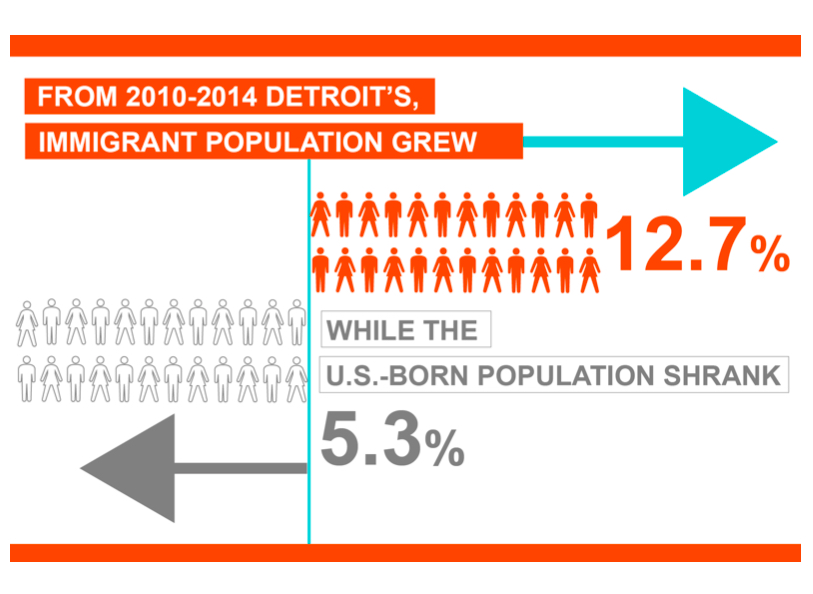One house, one family at a time, immigrants are helping refill Detroit

While media stories over the last few years have understandably chronicled the intense redevelopment of downtown and Midtown Detroit – including stories on just about every single retail opening and corporate move – immigrants have quietly been helping to stabilize and revitalize key neighborhoods in Detroit.
Global Detroit’s recent analysis of Census data from 2010-2014 demonstrates remarkable trends that suggest immigrants are playing a critical, but largely unnoticed and untold role in the city’s revitalization.
Unfortunately, Detroit’s U.S.-born population has continued to shrink over the last five years, decreasing 5.3 percent, which translates to 35,991 fewer U.S.-born Detroit residents between 2010 and 2014, according to the Census’ American Community Survey (ACS) one-year average. The rate of population loss during these years is considerably slower than the rate of loss during the prior decade, when Detroit lost approximately one-fourth of its population.
From 2000-2010, the annual rate of population loss is estimated to have exceeded 25,000 residents per year, while the last five years of data would put the annual rate of loss of U.S.-born around 7,000 residents per year, offset by a growth of foreign-born population slightly less than 1,000 residents per year.
But Detroit’s immigrant population grew a remarkable 12.7 percent, or 4,362 additional foreign-born residents, during the same 2010-14 period. Immigrants, as a share of the overall population in Detroit, grew from 4.8 percent to 5.7 percent during this period.
Evidence is pretty clear that immigrants are critical, if not necessary, to population growth in Rust Belt cities in the U.S. From 1960-’80, 29 of America’s 50 largest cities lost population. Detroit ranked fifth in the nation for greatest loss, shedding 28 percent of its residents over those two decades. In the 25 years after 1980, 14 of those 29 cities experienced population growth and immigrants played a substantial role, including accounting for all the growth in about half of the rebounding cities. Simply put, no great American city has been able to rebound from population loss without significant immigration growth.
The 2010 Global Detroit strategy report set forth a strategy to “cultivate immigrant and ethnic revitalization of neighborhoods in the City of Detroit and the region’s core communities.” Global Detroit has been working with a host of partners to execute this strategy.
Last week, Global Detroit, on behalf of the Welcoming Economies Global Network, worked with the Fiscal Policy Institute to release new research on the importance of immigrants as a source of new homeowners and vacant property acquisition in Detroit and 22 other Rust Belt cities. The research includes a new online tool that enables users to pick any of the 23 cities, select the cost of a new or rehabbed home, and determine the number of immigrant households currently renting who could afford the home.
The tool highlights that there are over 3,300 immigrant families renting in Detroit who could affordably acquire vacant properties and rehab them into viable housing (using $50,000 as acquisition and rehab costs). Global Detroit has been working to help immigrant families acquire and rehab vacant homes in southwest Detroit by acquiring tax-foreclosed properties from the Wayne County treasurer and Detroit Land Bank Authority. Earlier this month our 15th Spanish-speaking family successfully completed a vacant home purchase, many of who are first-time homeowners. The research and tool were featured in The Atlantic and CNN Money.
Global Detroit’s efforts to revitalize Detroit’s “opportunity neighborhoods,” as it calls them, is not limited to rehabbing vacant housing. Working with ProsperUS Detroit and the Detroit Economic Growth Corporation, the organization has helped immigrant entrepreneurs apply for and receive grants to expand their businesses and create more jobs.
Global Detroit also recently completed a six-month engagement process in the Banglatown neighborhood, along the Detroit-Hamtramck border, that brought together Bengali, Yemeni, African-American, and white residents to identify common concerns and priorities and develop coordinated approaches to improving the neighborhood for all residents. Global Detroit is working with Detroit Mayor Mike Duggan’s new Office of Immigrant Affairs and the Detroit City Council Immigration Task Force to create stronger and more vibrant neighborhoods across the city.
While the census numbers are encouraging that our strategies are taking root, revitalizing neighborhoods is about more than growing the population. Immigrants are helping to occupy vacant housing, launch new businesses, and volunteer for neighborhood block clubs and safety patrols. New immigrant families in Detroit help raise the quality of life for everyone, including African Americans and longtime residents.
Immigration is the untold American community revitalization strategy that has worked for generations and is very much a viable strategy in Detroit.
See what new members are saying about why they donated to Bridge Michigan:
- “In order for this information to be accurate and unbiased it must be underwritten by its readers, not by special interests.” - Larry S.
- “Not many other media sources report on the topics Bridge does.” - Susan B.
- “Your journalism is outstanding and rare these days.” - Mark S.
If you want to ensure the future of nonpartisan, nonprofit Michigan journalism, please become a member today. You, too, will be asked why you donated and maybe we'll feature your quote next time!
 Steve Tobocman is a former state representative who now serves as director of Global Detroit, a nonprofit organization dedicated to advancing immigration, foreign trade and investment.
Steve Tobocman is a former state representative who now serves as director of Global Detroit, a nonprofit organization dedicated to advancing immigration, foreign trade and investment.